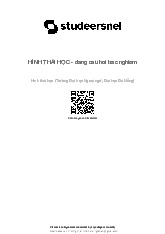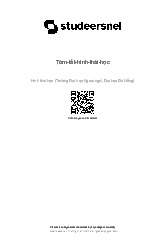



Preview text:
Ghi chú: Thí sinh làm bài trên PHIẾU TRẢ LỜI TRẮC NGHIỆM
Please tick (√) the right answer on the answer sheet:
1. Which of the following sounds odd with hereby?
a. “I bequeath $ 1000 000 to the Taxation Department.” c. “I swear I didn’t do it.”
b. “I swore I didn’t do it.” d. “I deny I did it.
2. Which of the following is a performative utterance?
a. “I admitted I had stolen that car.” c. “I believe she didn’t do that.”
b. “I punish him seriously.” d. “I name this ship Titan.”
3. Which of the following describes the sentence type and the act of this utterance?
Mother to child: “I’ll do it for you, son.”
a. interrogative; asserting c. declarative; requesting b.
declarative; ordering d. declarative; promising
4. Which of the following illocutionary act is performed by the utterance “You can use my car” (in normal circumstances)?
a. giving way c. giving permission b. apologizing d. leave-taking
5. Which of the following illocutionary acts is performed by the utterance “After you” (in normal circumstances)?
a. giving way c. giving permission b. apologizing d. leave-taking
6. Which of the following pair seems not to be an appropriate sequence?
a. request – promise c. request – acceptance
b. request – refusal d. request – greeting
7. Which of the following pairs seems to be an appropriate sequence?
a. congratulation – apology c. complimenting – accusation
b. accusation – leave-taking d. congratulation – thanking
8. Which of the following act is directive? a. accepting c. congratulation b. insulting d. advising
9. Which of the following acts is not an expressive? a. congratulating c. thanking b. forbidding d. complaining
10. Which of the following acts is commissive? a. complaining c. promising b. forbidding d. requesting
11. Which of the following act representative? a. asserting c. volunteering
b. thanking d. offering assistance
12. Which of the following is a direct directive act?
a. “I would appreciate if you open the door.” c. “Open the door!”
b.“Would you be so kind as to open the door?”
d. “Can you help me open the door?”
13. Which of the following is an indirect commissive act?
a. “I’ll do it when I finish my work.” c. “Do it for me, please”
b. “I promise to do it for you right away.” d. “Can I do it for you, please?”
14. Which of the following maxims the speaker is trying not to violate in this conversation?
A. John: “What happened during your interview today?”
B. Mary: “Well, to make a long story short, they didn’t hire me.” a. Quantity c. Relevance b. Quality d. Manner
15. Which of the following maxims the speaker is trying not to violate in this conversation?
John: “That was a great movie!”
Mary: “It sure was. Oh, by the way, do you have the car keys?” a. Quantity c. Relevance b. Quality d. Manner
16. Consider the following pair of sentences: A. Ralph likes anchovy pizza.
B. Ralph has tasted anchovy pizza.
Which of the following truth relation holds between (A) and (B)? a. (A) entails (B) c. (B) presupposes (A) b. (B) entails (A) d. (A) presupposes (B)
17. Consider the following pair of sentences: A. Fester has children.
B. Fester’s middle son is a dentist.
Which of the following best describes the sense relations between (A) and (B)?
a. (A) presupposes (B) c. (B) presupposes (A) b.
(A) entails (B) d. Both c and b
18. Consider the following sentences:
A. John knew that the window was open. B. The door was open.
Which of the following best describes the sense relations between (A) and (B)?
a. (A) presupposes (B) c. (B) presupposes (A)
b. (A) entails (B) d. (B) entails (A)
19. Consider the following sentences: A: Biff likes Muffy’s car.
B. Biff likes Muffy’s Mercedes Bent
Which of the following best describes the sense relations between (A) and (B)?
a. (A) presupposes (B) c. (B) presupposes (A)
b. (A) entails (B) d. (B) entails (A)
20. Which of the following is the explicit performative utterance?
a. “What are you doing?” c. “I’m sorry.”
b. “Open your book.” d. ‘I am asking you to turn on the light.”
21. Which of the following is the non-explicit performative utterance?
a. “I apologize for my being late.” c. “I stole the car.”
b. “I hereby name this ship Titanic.” d. “I confess I stole the car.”
22. Which of the following is a non-literal locution?
a. I can eat a horse. c. I’m almost starved.
b. I’m very hungry. d. I’m so hungry.
23. Which of the following is literal locution (in the wife’s effort to ask her husband to stop smoking)
a. Go ahead and smoke. See if I care. c. Think about your lungs.
b. Smoking is good for your lung. d. Smoking is glamorous.
24. Which of the following is an expression of negative politeness?
a. “I’ll come, Pal.” c. “Let me help you.”
b. “Let’s stop the chatter and get on with our essay.” d. “I’m sorry it’s a lot to ask, but could you lend me 5000 dollars?”
25. Which of the following is an expression of positive politeness?
a. A: “John went to London.” B: “To London?”
b. “I just drop by for a few minutes to ask you if you can hang out with me” c. “Come here, honey!”
d. “Would you mind opening the door for me?”
***** The end *****


